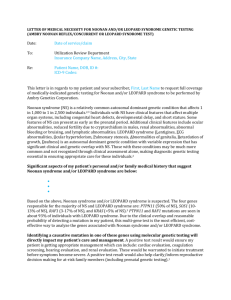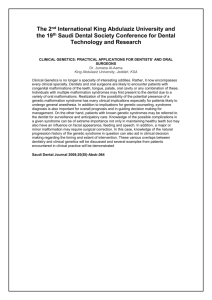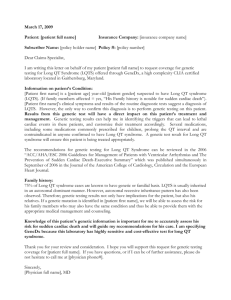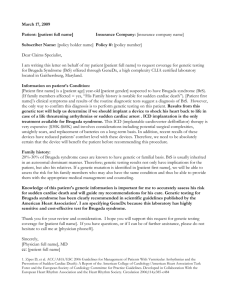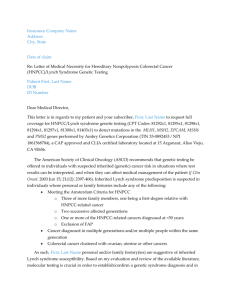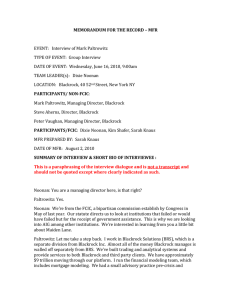Noonan and Related Syndromes LMN
advertisement
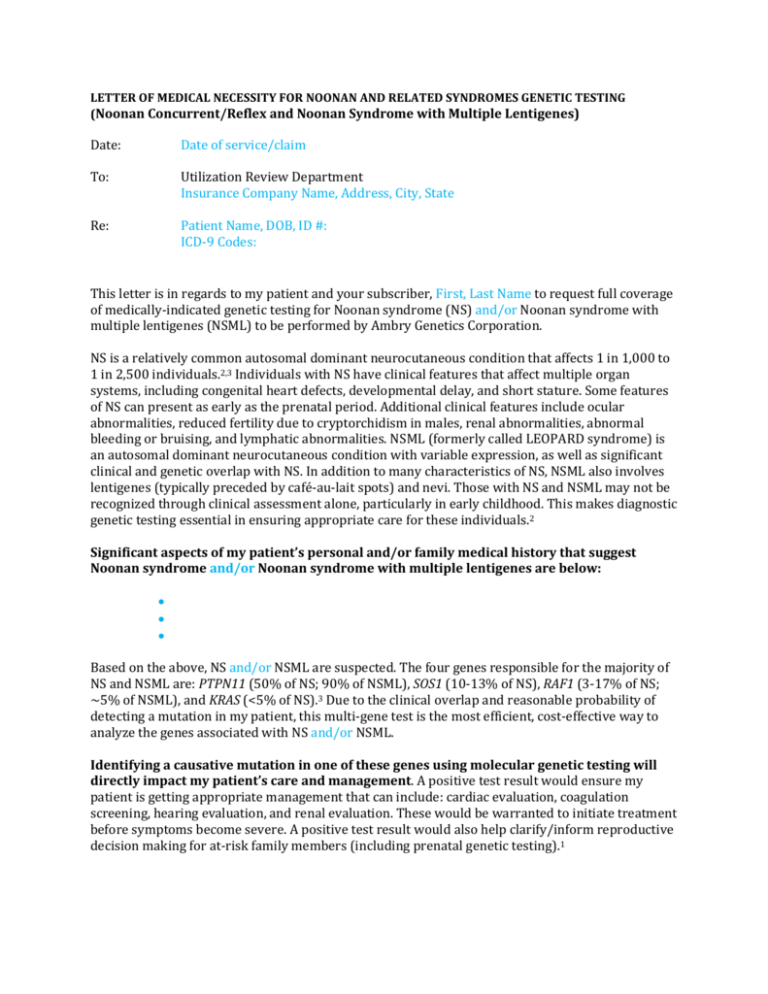
LETTER OF MEDICAL NECESSITY FOR NOONAN AND RELATED SYNDROMES GENETIC TESTING (Noonan Concurrent/Reflex and Noonan Syndrome with Multiple Lentigenes) Date: Date of service/claim To: Utilization Review Department Insurance Company Name, Address, City, State Re: Patient Name, DOB, ID #: ICD-9 Codes: This letter is in regards to my patient and your subscriber, First, Last Name to request full coverage of medically-indicated genetic testing for Noonan syndrome (NS) and/or Noonan syndrome with multiple lentigenes (NSML) to be performed by Ambry Genetics Corporation. NS is a relatively common autosomal dominant neurocutaneous condition that affects 1 in 1,000 to 1 in 2,500 individuals.2,3 Individuals with NS have clinical features that affect multiple organ systems, including congenital heart defects, developmental delay, and short stature. Some features of NS can present as early as the prenatal period. Additional clinical features include ocular abnormalities, reduced fertility due to cryptorchidism in males, renal abnormalities, abnormal bleeding or bruising, and lymphatic abnormalities. NSML (formerly called LEOPARD syndrome) is an autosomal dominant neurocutaneous condition with variable expression, as well as significant clinical and genetic overlap with NS. In addition to many characteristics of NS, NSML also involves lentigenes (typically preceded by café-au-lait spots) and nevi. Those with NS and NSML may not be recognized through clinical assessment alone, particularly in early childhood. This makes diagnostic genetic testing essential in ensuring appropriate care for these individuals.2 Significant aspects of my patient’s personal and/or family medical history that suggest Noonan syndrome and/or Noonan syndrome with multiple lentigenes are below: Based on the above, NS and/or NSML are suspected. The four genes responsible for the majority of NS and NSML are: PTPN11 (50% of NS; 90% of NSML), SOS1 (10-13% of NS), RAF1 (3-17% of NS; ~5% of NSML), and KRAS (<5% of NS).3 Due to the clinical overlap and reasonable probability of detecting a mutation in my patient, this multi-gene test is the most efficient, cost-effective way to analyze the genes associated with NS and/or NSML. Identifying a causative mutation in one of these genes using molecular genetic testing will directly impact my patient’s care and management. A positive test result would ensure my patient is getting appropriate management that can include: cardiac evaluation, coagulation screening, hearing evaluation, and renal evaluation. These would be warranted to initiate treatment before symptoms become severe. A positive test result would also help clarify/inform reproductive decision making for at-risk family members (including prenatal genetic testing).1 Due to the interventions available to reduce morbidity associated with characteristics of NS and NSML, this genetic testing is medically indicated. As such, I am ordering this testing as medically necessary and affirm that my patient has provided informed consent for genetic testing. A positive test result would confirm a genetic diagnosis in my patient, and would ensure my patient is being managed appropriately. I am specifying Ambry Genetics Corporation because this laboratory has highly sensitive and cost-effective testing for NS and NSML, along with a large database of previously tested patients to ensure highly validated, accurate, and informative test interpretation. I recommend that you support this request for coverage of diagnostic genetic testing for NS and/or NSML in my patient. Genetic testing can take up to several weeks to complete, and the laboratory will not bill until testing is concluded. Therefore, we are requesting that the authorization be valid for 3 months. Thank you for your time, and please don’t hesitate to contact me with any questions. Sincerely, Ordering Clinician Name (Signature Provided on Test Requisition Form) (MD/DO, Clinical Nurse Specialist, Nurse-Midwives, Nurse Practitioner, Physician Assistant, Genetic Counselor*) *Authorized clinician requirements vary by state Test Details CPT codes: 81406x3, 81405x1 (Ambry Noonan Concurrent/Reflex); 81406x1 81404x1 (Noonan Syndrome with Multiple Lentigenes, formerly LEOPARD syndrome testing) Laboratory: Ambry Genetics Corporation (TIN 33-0892453 / NPI 1861568784), a CAPaccredited and CLIA-certified laboratory located at 15 Argonaut, Aliso Viejo, CA 92656 References: 1. Romano AA, Allanson JE, Dahlgren J, et al. Noonan syndrome: clinical features, diagnosis, and management guidelines. Pediatrics. 2010;126:746–59. 2. Bhambhani V, Muenke M. Noonan syndrome. Am Fam Physician. 2014 Jan 1;89(1):37-43. 3. Allanson JE and Roberts AE. Noonan Syndrome. GeneReviews. Pagon RA, Adam MP, Ardinger HH, et al. , editors. Seattle (WA): University of Washington, Seattle; 1993-2015.
